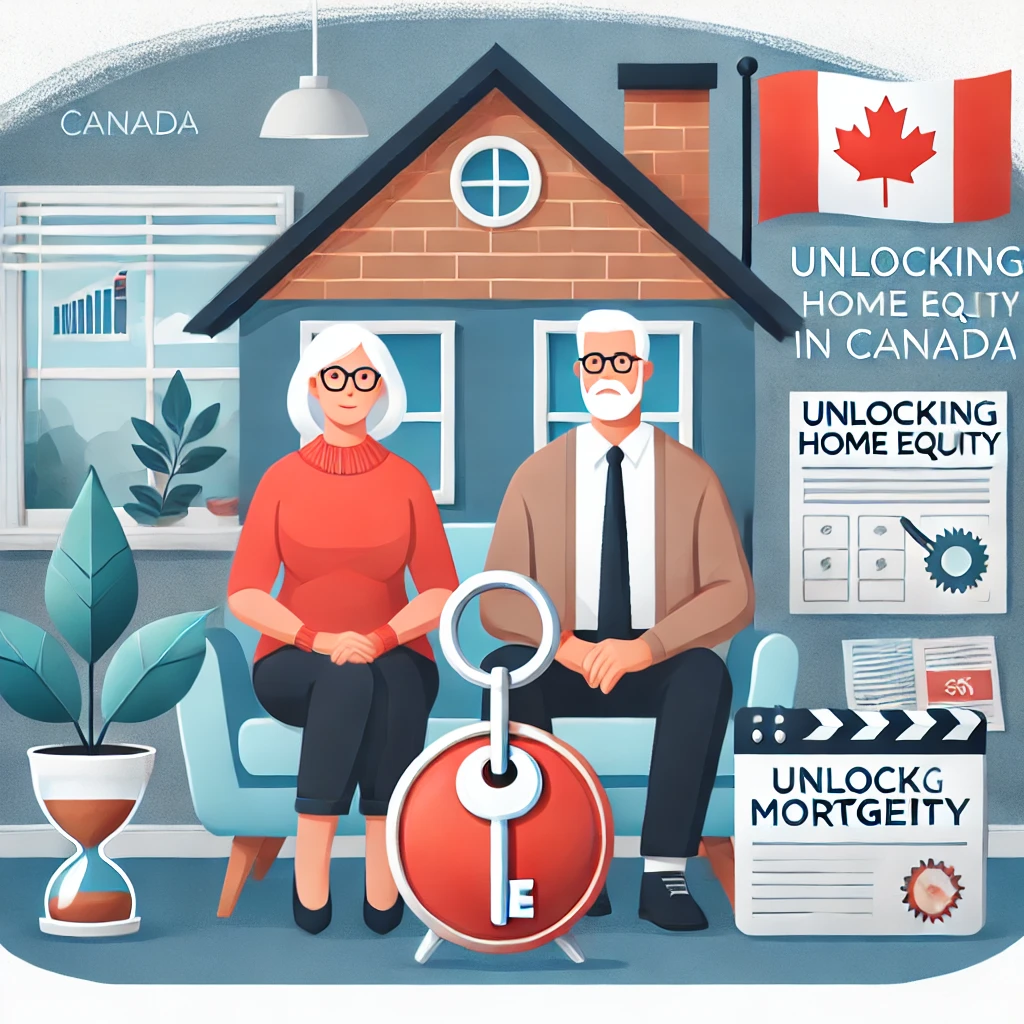How Reverse Mortgages Work in Canada
Many Canadian seniors spend their working lives paying down mortgages, hoping to become mortgage-free by retirement. So, why would someone want to take on a reverse mortgage? Especially if they’ve already paid off their mortgage? This is a question I frequently hear from clients.
This guide will explain how reverse mortgages work, their benefits, and the essential costs to consider. We’ll also dive into statistics, FAQs, and external resources to help you understand this product better.
Why Do Canadians Need Reverse Mortgages?
To understand why seniors consider reverse mortgages, let’s first look at some data:
- The average income for Canadians aged 25-54 was $64,500 in 2021.
- Income for adults aged 65 and over drops significantly to $44,000.
- Many Canadians retire with significant debt, including $130,000 in mortgage debt for those over 65.
This drop in income, coupled with ongoing debt payments, leads to a cash flow crunch for many retirees. Their home becomes their most valuable asset, and they consider how to unlock the equity they’ve built up over the years. Source: Statistics Canada
How Reverse Mortgages Solve the Cash Flow Problem
Reverse mortgages allow homeowners aged 55 and older to convert up to 55% – 59% of their home’s equity into tax-free cash without selling their property. The home secures this loan, and no monthly mortgage payments are required as long as the homeowner continues to live there.
Here’s why seniors choose reverse mortgages:
- Access home equity without selling
- No monthly payments required
- Maintain ownership of the home
- Tax-free cash that doesn’t impact pensions like CPP or OAS
What is a Reverse Mortgage?
A reverse mortgage is a type of home equity loan available to homeowners aged 55 and older. Your primary residence secures the loan; no monthly payments are required as long as you live there. The loan is repaid only when the home is sold, you move out, or you pass away.
Homeowners can choose to receive the funds in various forms:
- A lump sum
- Monthly payments
- A combination of both
Get An Estimate
See How Much You Can Borrow Today!

How Much Can You Borrow?
The amount you can borrow depends on several factors, including:
- Your age: Older homeowners can borrow more.
- Home value: The higher your home’s value, the more you can access it.
- Location: Homes in urban centers like Toronto and Vancouver often qualify for larger loans due to higher property values.
You can use a free reverse mortgage calculator to estimate your borrowing potential.
Why Is It Called a Reverse Mortgage?
The “reverse” in reverse mortgage refers to how the loan operates. Instead of paying down the mortgage balance, the loan amount increases over time as interest is added back to the balance monthly.
- Traditional mortgage: Balance decreases as you make monthly payments.
- Reverse mortgage: Balance increases as interest is added monthly, but no monthly payments are required.
Unlike traditional mortgages, reverse mortgages allow you to stay in your home while accessing your home’s equity.
How is Reverse Mortgage Interest Calculated?
Reverse mortgage interest is calculated similarly to traditional mortgages. The difference lies in the compounding period.
- Reverse mortgage interest: Compounded semi-annually in Canada.
- HELOC interest: Compounded monthly, meaning interest accumulates faster.
Reverse Mortgage Interest Rates in Comparison
Reverse mortgage interest rates tend to be higher than traditional mortgages but comparable to other credit options. Here’s how they compare:
| Loan Type | Interest Rate (Annual) | Monthly Payments Required |
|---|---|---|
| Reverse Mortgage | 6.5% – 7.5% | No |
| HELOC | 3.95% – 5.5% | Yes |
| Traditional Mortgage | 2.5% – 4.0% | Yes |
Learn more about reverse mortgage interest rates here.
Get An Estimate
See How Much You Can Borrow Today!

How to Qualify for a Reverse Mortgage
To qualify for a reverse mortgage in Canada, you must meet the following criteria:
- Be 55 years or older
- Own your home as your primary residence
- Sufficient home equity
You can borrow up to 55% of your home’s equity, but the final amount will depend on your age, home value, and location. To get an accurate estimate, complete a reverse mortgage application with a Citadel Mortgages.
Who Offers Reverse Mortgages in Canada?
There are two primary providers of reverse mortgages in Canada:
- HomeEquity Bank (CHIP Reverse Mortgage): Allows homeowners to access up to 55% of their home’s value.
- Equitable Bank (Flex Reverse Mortgage): Offers up to 59% of home equity and has slightly lower rates and fees than CHIP.
- Bloom Reverse Mortgage: Allows Canadians to access up to 55% of the home equity and focuses on client expereince.
Each lender offers different terms and conditions, so it’s important to consult both and see which one fits your needs best.
Reverse Mortgage Fees and Costs
When taking out a reverse mortgage, expect the following costs:
- One-time setup fee: Typically ranges from $995 to $1,995.
- Property appraisal: Costs between $300 to $500.
- Legal advice: Required by law, ranging from $300 to $750.
These costs can be deducted from the loan proceeds. Learn more about reverse mortgage fees.
How Do People Use Reverse Mortgages?
Seniors use reverse mortgages for various purposes, including:
- Boosting retirement income: Set up monthly payments to supplement OAS and CPP.
- Paying off high-interest debt: Use the tax-free cash to eliminate credit card or loan balances.
- Funding home renovations: Make home improvements to support aging in place.
Reverse mortgages are also popular for providing financial support to family members or delaying the sale of a home.
Learn more about how reverse mortgages help seniors.
Reverse Mortgage FAQs
What happens if my loan exceeds my home’s value?
Reverse mortgages in Canada come with a negative equity guarantee, meaning you or your heirs will never owe more than your home is worth when sold.
Can I make monthly payments on a reverse mortgage?
Yes, both HomeEquity Bank and Equitable Bank allow optional payments.
Conclusion
A reverse mortgage provides a solution for Canadian seniors who want to access the equity in their homes while continuing to live there. With tax-free cash and no monthly payments, this product offers financial flexibility in retirement.
Citadel Mortgages is one of Canada’s leading brokerages specializing in reverse mortgages. Visit Citadel Mortgages to learn more today.
Get An Estimate
See How Much You Can Borrow Today!


